DAVE'S DIARY - 28 MAY 2008 - ALAN JACKSON
ALAN JACKSON REACHES BACK TO 1976
"A pretty little blonde haired girl/ stole my heart and changed my world/ two kids and a moonlit sky/ a little love on a Friday night/ built a fire that just won't quit/ that was 1976" - 1976 - Alan Jackson.
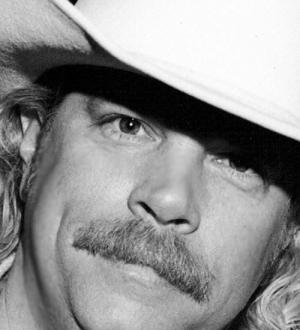 |
Don't
dismiss Alan Jackson as a bucolic balladeer floating gently in the
mainstream. The Georgian born chart topper has taken subtle risks from his career genesis almost three decades ago. The first was signing for management by an outsider - expatriate Australasian Barry Coburn and helping launch the Nashville branch of Arista Records. Jackson also took a punt when he and Texan troubadour George Strait recorded the Nashville parody Murder On Music Row. The duo fanned the flames by performing the Larry Cordle-Larry Shell song on major awards shows. |
And, more recently, Jackson recorded gospel album Precious Memories and acoustic disc Like Red On A Rose with Alison Krauss as producer.
Now, he has
returned to original producer Keith Stegall, for 17th album Good Time.
Stegall also produced expatriate Australian starlet Catherine Britt's
second album Too Far Gone.
Jackson wrote 22 songs for his new disc.
Despite his culling of five tunes it still left 17 on Good Time
- also good value.
The story of Jackson, son of a small town motor mechanic, and Denise his
wife of 29 years, is a perfect rags-to riches tale.
|
Denise,
daughter of a postal worker, met her husband in 1976 after church
services on a warm Sunday night in their hometown Newnan - also
birthplace of Steve Young. They left Georgia for Nashville in 1985. |
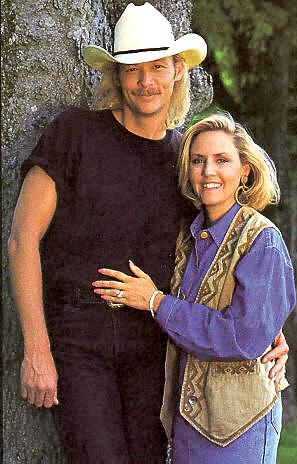 |
JACKSON AND JESUS
"If
Jesus walked the world today/ he's probably be a hillbilly/ common man
of men/ and the king of many/ he'd lay his hand on his brother man/ save
us all from the sinning." - If Jesus Walked The World Today -
Alan Jackson.
Now, 23 years later with 45 million album sales and 32 #1 hits, Jackson
can afford to limit his touring.
There have been predictions of Australian tours by Jackson, Tim McGraw
and Alison Krauss but so far no firm dates.
Jackson may not need to tour here - his prolific CD output has won him
a strong fan base with no mainstream airplay.
Maybe he could be tempted to tour as a working holiday for his family.
Alan, Denise and their three daughters Mattie, 17, Ali, 14, and Dani,
10, now live in luxury.
One of the family's homes is a 24,000-square-foot Southern manor on 140
picturesque acres along the Harpeth River in Williamson County - a stretch
of land that includes a lake, three ponds, a barn and a cabin.
They have another house on Centre Hill Lake and a Florida vacation home.
Denise Jackson details all this in best selling 2007 book It's All
About Him: Finding the Love of My Life.
The first book topped the New York Times best selling chart so she has
since released a second book - The Road Home.
Denise's first tome delved into the couple's separation at the peak of
his career climb and their romantic resurrection.
It's a different resurrection to that described in the Good Time
finale song - sardonic social comment saga, If Jesus Walked The World
Today.
BACK TO THE FUTURE
"His long hair and sandal feet would be in style/ surround himself with good ole boys to tell his tale/ he'd have a mighty cross tattoo on his hands by the nail holes that killed him." - If Jesus Walked The World Today - Alan Jackson.
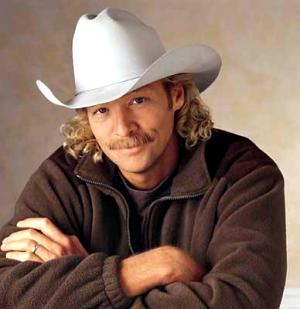 |
Jackson
has been a prolific writer from the start - 1989 debut disc Here
In The Real World featured six co-writes with tunesmiths such
as Stegall, Jim McBride, Roger Murrah, Mark Irwin and Charlie Craig. "The way it started was that someone said you've got to have a tape to showcase your singing, and you've got to have your own material," Alan, 50 on October 17, recalled his career roots in a recent interview with American Songwriter. "Once I realised that I had to have original material to sing, I wrote some things and went into a studio in Atlanta. A guy I knew helped me put them down - just guitars and some bass, really. And that's what I had in my hand when I came to Nashville." |
While the
number of outside songs rose between 1989 and 2000, so did Jackson's solo
writing efforts.
By 2002 and the chart-topping Drive, eight of the album's songs were Jackson
solo compositions, with three outside numbers and a lone co-write.
"I didn't quit co-writing for any reason other than that I was gone
all the time," says Jackson.
"It was easy to write on the bus - when we're on tour I don't do
much but sit on the bus and go out there and sing - and I get a lot of
ideas riding down the road. And then, when I'm home, I'm doing things
with the family, so it just seems easier to write by myself than set up
appointments."
The musicians who play on Good Time are, with one exception, the
same ones who played on his debut almost 20 years ago, from fiddler Stuart
Duncan to guitarist Brent Mason to piano legend Hargus "Pig"
Robbins.
"Pig missed a year or two when he was sick, but they've remained
pretty true all these years," Jackson recalled.
"These guys know what an Alan Jackson record is supposed to sound
like," Stegall added.
GOOD TIME ON CHART TOPS
"Pig in the ground, beer on ice/ just like ole Hank taught us about/ singing along Bocephus songs/ rowdy friends all night long." - Good Time - Alan Jackson
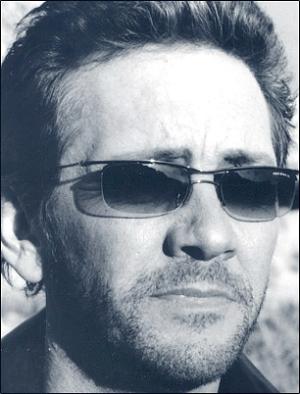 Keith Stegall |
Jackson
detailed the embryo of his new 71-minute disc and recording with his
session supremos. "The first song we cut was Good Time, and I could see them kind of light up, and that just stayed on through the session," Jackson revealed. "Keith and I will get on the bus, play things on guitar and figure out what we're going to do. Then Brent (Mason) will come on the bus, I'll play it for him, he'll chart it, and we'll work up an arrangement while I sing along. I'll hear an arrangement in my head - not as detailed as it ends up, but I know what kind of production a song's going to have. Keith and I have always worked together, and he'll have an idea and I'll have an idea, and we just try to do some different things. I guess that's a culmination of everything I've done; back when I was playing in the bars, people wanted to hear a lot of different kinds of things. |
Then when we go into the studio, most of the time we just do one or two takes live. It's pretty much a live cut musically; I don't sing a song more than two or three times, four at the most, and then we'll move on to the next. We don't patch it all up or tune it to death. We just try to get a natural vocal."
SMALL
TOWN SOUTHERN MAN VIDEO
"Born the middle son of a farmer and a small town southern man/ like
his daddy's daddy before him, brought up working on the land/ fell in
love with a small town woman and they settled down." - Small Town
Southern Man - Alan Jackson.
"Actually,
I wrote 22 and we cut all of them," Jackson says.
"The label wanted 12, but I felt that these 17 belonged together.
There were some of the bunch that might have been a little repetitious
in the style, so I didn't mind leaving those off.
But if I'd left one of these 17 off, I'd probably have replaced it with
one of the others. It wasn't a plan to use all of my songs. I've always
been careful to feel that. I don't care who writes it. I don't care where
it comes from or if it's a remake. We just want to make the best record
and try to mix it up. I've seen too many singer songwriters think everything
they write is great. I don't force-feed my stuff."
The first hit single Small Town Southern Man, accompanied by a
video clip, is an autobiographical tale torn from Jackson's back pages.
The song, Jackson's 51st single, helped shoot Good Time to #1 on
the Billboard all genre charts on debut with sales of 119,151 - his fourth
album to attain #1 on debut.
"I got to dress up sort of like Hank Williams Jr. from that era and
kind of the '70s-looking thing with the big side burns and all that in
the video," Jackson joked.
"That was pretty cool. I've had a lot of comments about that - the
sideburns, mainly, in that scene where it's kind of real funky looking."
SISSY'S SONG
"She flew up to heaven on the wings of angels/ by the clouds and stars and past where no one sees and she walks with Jesus and her loved ones waiting." - Sissy's Song - Alan Jackson.
| Jackson
revealed that Sissy's Song was based on a human tragedy. "That's a song about a girl that worked in our house and was part of our family," he says. "After her accidental death last spring, the song "just came out in about 15 minutes. It helped me, and I think it helped make her family feel special. I did a guitar and vocal on it, and we played it at her funeral. That's what we put on the album. It wasn't intended to be on there, but Keith argued pretty strongly for it." |
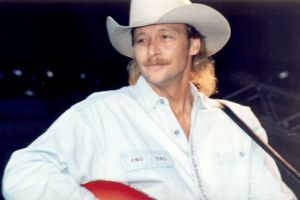 |
Jackson's
disc also features a duet with Martina on Never Loved Before.
Other highlights include Right Where I Want You - a waltz - the
bluegrass laced Long, Long Way, the culinary metaphor of I Still
Like Bologna and honky tonk rooted If You Want To Make Me Happy.
Jackson mines a self-deprecatory humour motherlode in the bravado of Country
Boy but his character struggles with romance resurrection in Nothing
Left To Do.
There's also a tinge of regret in I Wish I Could Back Up - perhaps
an apology to his spouse.
"Time takes you places you never knew you'd be goin'/ it softens
the edges of memories you're towin'/ it changes the reasons you wanted
to hold her/ I wish I could back up and start all over."
Jackson covers all bases from an attempt to refresh the boudoir joys in
Nothing Left To Do, diverse shades of love in Listen To Your
Senses, When The Love Factor's High and This Time and Jimmy
Buffett style escapism in Laid Back In Low Key.
With 17 songs Jackson delivers on a disc that grows on repeated listening.
It's a far cry from my first meetings with the singer in 1988 at then
manager Coburn's Music Row office and a Vern Gosdin concert at a car dealership
in Civil War town Franklin.
At that stage he was cutting his debut disc with Keith Stegall whose future
Australian client Catherine Britt was just five.
A belated Australian tour would be good tidings for Britt, who supported
Jackson and Brooks & Dunn, on a U.S. tour when she was still with
BMG.